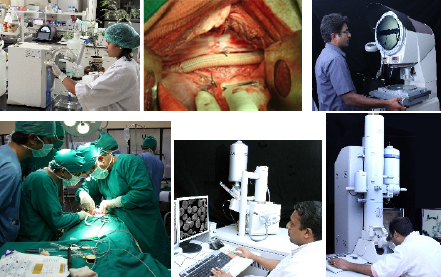|
Sree Chitra Tirunal
Institute For Medical Sciences And Technology (SCTIMST)-Your
Partner
For Testing And
Bilogical Evaluation Of Medical Devices & Biomaterials
|

Sandhya C G,
Scientist F, SCTIMST
Email: csc@sctimst.ac.in |
Testing and Biological evaluation
of the medical devices based on international
standards is gaining importance for meeting regulatory
requirements in the country. In the selection of
materials to be used in device manufacture, the
initial consideration is the fitness for purpose with
regard to characteristics and properties of the
material, which include chemical, toxicological,
physical, electrical, morphological and mechanical
properties. This is followed with a comprehensive
biological evaluation including the biocompatibility
evaluation to assess the possible biological hazards
and the functional performance.
The Biomedical Technology Wing (BMT)
of Sree Chitra Tirunal Institute for Medical Sciences
& Technology, Trivandrum, which is an Institute of
National Importance under the Department of Science &
Technology, Government of India, has established a
strong testing and evaluation capability for not only
its own R&D activities but also has been a pioneer in
offering an accredited testing service to the medical
device industry and academia since 2003. Medical
device industry across the country have availed the
testing services of the Institute and it has
facilitated many of them obtain regulatory approvals
from Central Drugs Standard Control Organization (CDSCO)
in India. |
Quality Management System
The Quality Management System (QMS) for testing services
confirms to the international standard ISO/IEC 17025:
“General requirements for the competence of testing and
calibration laboratories”. The expertise and
infrastructure for testing of medical devices and
biomaterial conforming to the QMS has been operational
for more than two decades. Some of the highlights of the
testing and calibration services offered by SCTIMST
includes the following :
 |
Certified medical device testing
laboratory under CDSCO |
 |
About twenty biological tests which
includes biocompatibility testing also are accredited
by Le ComiteFrancaisd’Acreditation (COFRAC) of France.
The test reports of all accredited tests are issued
with the COFRAC logo. |
 |
Calibration services (mechanical and
thermal calibration) are accredited by National
Accreditation Board for Testing & Calibration
Laboratories (NABL) |
 |
Physico-chemical testing (Residual EO, Compositional
Analysis of materials using TGA, Determination of
Transition Temperature & Enthalpies of fusion and
crystallization of materials using DSC) is accredited
by National Accreditation Board for Testing &
Calibration Laboratories (NABL). |
Physicochemical Characterization
Material characterization is a critical initial step in
the biological evaluation process. The following is
generally taken into account for their relevance to the
overall biological evaluation of the device:
a) the material(s) of manufacture;
b) intended additives, process contaminants and
residues;
c) leachable substances;
d) degradation products;
e) other components and their interactions in the final
product;
f) the performance and characteristics of the final
product;
g) physical characteristics of the final product,
including but not limited to, porosity, particle size,
shape and surface morphology.
Identification of material chemical constituents and
consideration of chemical characterization shall precede
any biological testing. Physical effects of the device
shall be considered if they impact the biocompatibility
and also for the functional efficacy.
Services Offered for Physicochemical Characterisation
at SCTIMST
Imaging
Scanning electron microscopy
Transmission electron microscopy
Micro CT
Fluorescence microscopy
Stereo microscopy
Confocal Raman
Atomic Force microscopy
Live animal imaging
Chromatography
Gas chromatography – Qualitative, Quantitative, Residual
Ethylene Oxide
Gel Permeation chromatography
High Performance Liquid chromatography
Spectroscopy
FTIR spectroscopy
UV visible spectroscopy
Micro Raman Spectroscopy
X- ray diffraction spectroscopy
Trace element analysis (ICP-OES)
Thermal analysis
Differential Scanning Calorimetery (DSC)
Differential Thermal Analysis(DTA)
Thermogravimetric Analysis (TGA)
Mechanical testing – tensile, compressive, shear,
3 point bending, Dynamic Mechanical analysis -
Profilometry – line/surface scanning
Tests for PPE and fabrics
Tensile strength and elongation at break, tear strength,
synthetic blood penetration test, water vapour
transmission rate
Biocompatibility Testing
Devices are made of a diverse range of materials and
have various intended uses, with body contact ranging
from transient skin contact to contact with blood to
permanent implantation. The properties and safety of
these materials must be carefully assessed with respect
to the specific application in question and its degree
of patient contact. An important principle in the safety
assessment of medical devices is that a material that
was found to be safe for one intended use in a device
might not be safe in a device intended for a different
use. Accurate characterization is an essential step in
selecting a material for a medical device, but
ultimately the final assessment must be performed on the
finished product, under actual use conditions. The
specific methods used to characterize materials depend
in part on the criticality of the medical device for
which they are intended.
Biocompatibility testing and evaluation of medical
devices is performed to determine the potential toxicity
resulting from contact of the device with the body. The
device materials should not—either directly or through
the release of their material constituents—produce
adverse local or systemic effects, be carcinogenic, or
produce adverse reproductive and developmental effects.
Therefore, evaluation of any new device intended for
human use requires data from systematic testing to
ensure that the benefits provided by the final product
will exceed any potential risks posed by device
materials. The intended clinical use of a medical device
needs to be understood in order to determine the extent
of biocompatibility testing required.
 |
